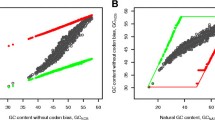Abstract
The negative correlation between the frequencies of usage of amino acids and their biosynthetic cost suggests that organisms minimize costs of protein biosynthesis. Empirical results support that: (1) free-living organisms (Archaea, Bacteria, and Eucaryota) minimize the usage of heavy amino acids more than intracellular organisms (viruses, chloroplasts, and mitochondria), a result confirmed by comparing intracellular Bacteria with other Bacteria; (2) avoidance of amino acids with low impact on protein structure (Chou-Fasman indices) is greater than for those with equal molecular weight but greater structural impact: constraints on protein function limit cost-minimization; (3) amino acid weight minimization (WM) for a protein correlates positively with the protein's expression level and with its size; (4) preliminary results suggest that for different proteins, the evolutionary rate of amino acid replacements correlates negatively with WM in these proteins; (5) results suggest that WM decreases with genome-size; and (6) developmental rates correlate positively with WM (within primates and rodents), even after confounding factors were accounted for. Effects of biosynthetic cost-minimization at whole-organism levels vary with metabolic and ecological strategies. Biosynthetic cost-minimization is an adaptive hypothesis that yields a semi-mechanistic explanation for small differences in allele fitness.
Similar content being viewed by others
Author information
Authors and Affiliations
Rights and permissions
About this article
Cite this article
Seligmann, H. Cost-Minimization of Amino Acid Usage . J Mol Evol 56, 151–161 (2003). https://doi.org/10.1007/s00239-002-2388-z
Received:
Accepted:
Issue Date:
DOI: https://doi.org/10.1007/s00239-002-2388-z




